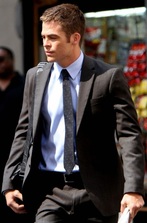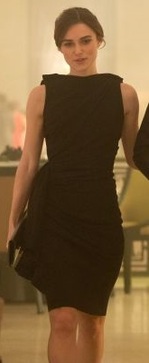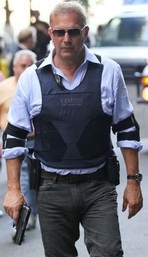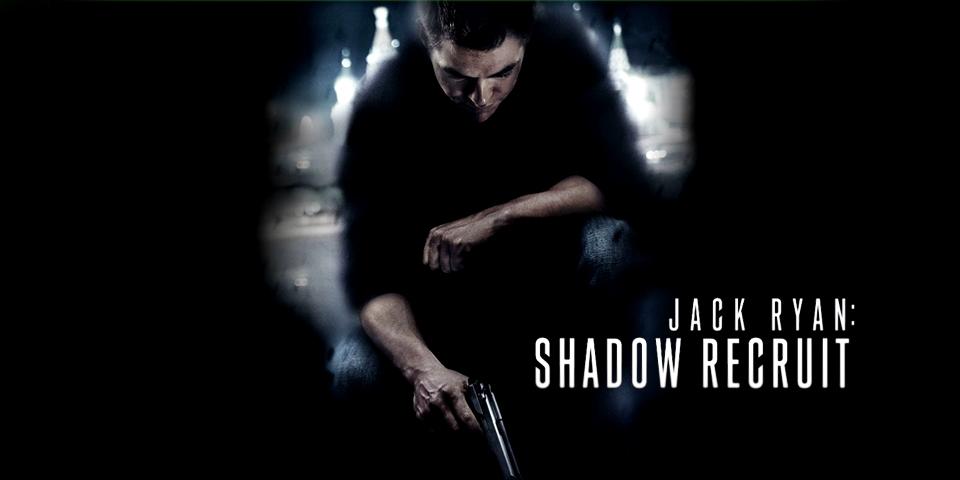“To go beyond is as wrong as to fall short.”
-- Confucius
-- Confucius
 Pine as Ryan
Pine as Ryan I admit that when plans were announced to reboot the Jack Ryan franchise, I was desperate for anything above Ben Affleck's mouth-constantly-agape performance in Sum of All Fears. When they cast Chris Pine, for whom I am a card-carrying member of the "He's underutilized" club, my hopes were admittedly high. Perhaps then, I am so desperate to see this movie as great, that I am overrating it. After all, you'll soon see that my take differs from the critical consensus (and seemingly the audience consensus too; the movie open at #4 and was given a "B" CinemaScore) who generally feel it is pretty "meh". I will concede that at times, the movies bit off a little more than it could chew, and rushed through some plot holes in the hopes the audience didn't notice them, but overall it is a promising, if uneven start to a franchise that sadly, probably won't get back off the ground given the disappointing initial performance of the film.
 Knightley as Muller
Knightley as Muller Because every reboot has to tell the origin story, this Jack Ryan begins during his time in college, when he sees 9/11 unfold on a television screen on campus. Because The Hunt for Red October alluded to Ryan teaching himself to walk again after a helicopter crash, we smash cut to 18 months later, and he's a Lieutenant on a helicopter. We get the inevitable crash, we get the requisite exposition to the doctor of his heroics (he pulled two people out of the helicopter despite a broken back!) before cutting to his rehab time. While this sort of adherence to the timeline laid out in Jack Ryan movies past is noble, it makes your head hurt to think about it too much (in the future, during the Cold War, Jack Ryan will be aboard a sub... wait, what?). During his rehab, he is approached by Harper, a CIA operative (Kevin Costner) who recruits him as a financial analyst. Ryan will have a civilian job at a bank on Wall Street, and use that position to uncover funding for terrorists. If all this seems like a whirlwind to cover in just Act 1, it's because the movie has two separate terrorist plots to get to in the meat of the story! At the center of both of them is Viktor Cherevin (Kenneth Branagh, who also directs), a Russian oligarch who plans on using his immense means to collapse the dollar and bring about the second Great Depression in the U.S. Concurrent to this, he also plans to stage a more traditional terrorist attack on Wall Street because it will take the two in concert to really cripple the U.S.... although I'm not entirely sure why. The movie gives you enough to sort of piece together a shaky explanation, but it certainly could've spent some time putting that reason on screen.
 Costner as Harper
Costner as Harper Along the way, we encounter numerous plot holes: Ryan's fiancé is pressed into emergency black-ops service roughly ten minutes after she discovers the truth about Ryan, because Cherevin has invited the two of them to dinner. Ryan's only objection to this is that he should go alone, presumably because in the age of social media, they couldn't just send a female operative to pose as his wife. It would've been nice, however, if genius-and-super-concerned Ryan had at least raised the possibility of that as an option. Along the same social media lines, during a tense scene later, Ryan instructs analysts to "check Instagram, Facebook, Hopscotch, Reddit" for connections to where the attack might occur. What are the odds one of those social media references sounds painfully dated in a few years? He might as well have instructed them to check Myspace and Napster while he was at it. The villain is revealed to be months away from death due to cirrhosis, which is why he is suddenly so willing to expose himself in the name of his ideology, yet aspects of this plan are revealed to have been set in motion by him over a decade ago. His impending death actually makes him a less effective villain unnecessarily, reducing his motivation from nationalism to "why not?"
 Branagh as Cherevin
Branagh as Cherevin Branagh's direction is capable enough in all of this, but he seems intent on filming the "grittiest" (the ubiquitous buzzword in Hollywood and goal of all reboots these days) Jack Ryan movie he can. Ironically, this focus on spies without fake identities and elaborate covers makes the movie that much more realistic. Because of the interconnectedness of the world today, the cloak-and-dagger is largely gone from espionage; the actual CIA employees reduced to handlers for the actual spies: locals in advantageous positions to acquire intel. But Branagh shapes a movie that seems like it stumbled into whatever realism it achieved over its predecessors. Re-imagining Jack Ryan as an action hero is an inadvisable move for a cinematic world already littered with them. His appeal was always in his ability to outthink his adversaries, not in his ability to beat them up jump out of moving cars. He's not just "American James Bond" and was never meant to be (one scene in particular, where he uses a seatbelt through a steering wheel to "autopilot" a car evokes memories of Casino Royale). Still it's easy enough from this movie on to return Ryan to his analyst roots and Chris Pine's performance proves he's more than up to the task of carrying the franchise. When considered as a single movie, the entertainment value is high enough to warrant a better rating than I'm giving it, but when compared to what it needed to be to make Jack Ryan appeal to a new generation, it falls just short.
A movie that tries to take the franchise in a refreshing new direction, but loses sight of its characters



 RSS Feed
RSS Feed